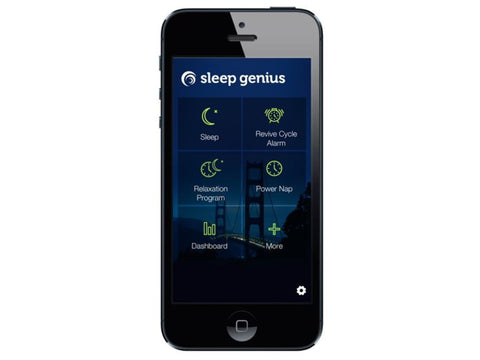Sleep is often overlooked in favor of those things we do during our conscious hours. We feel that we can’t control it, we desire less of it in the quest for productivity, but that mindset—says sleep scientist Matthew Walker—is killing us. “The shorter your sleep, the shorter your life,” he says in his four-years-in-the-making book Why We Sleep: Unlocking the Power of Sleep and Dreams

Until recently, scientists hadn’t spent an awful lot of time researching the benefits of sleep, such is our human precondition to ignore the most restorative process our bodies and minds demand. Now, though, scientists like Walker have begun to solve the mystery that caused him to abandon research in dementia more than two decades ago: why do we sleep? Thousands of studies later, we are not asking what sleep is good for—rather whether there are any biological functions not benefited by a good night’s sleep.
“Emerging from this research renaissance is an unequivocal message,” says the professor of neuroscience and psychology at the University of California, Berkeley, “sleep is the single most effective thing we can do to reset our brain and body health each day—Mother Nature’s best effort yet at contra-death. Unfortunately, the real evidence that makes clear all of the dangers that befall individuals and societies when sleep becomes short have not been clearly telegraphed to the public. It is the most glaring omission in the contemporary health conversation.”
As a result of the public’s blasé attitude toward sleep, we live in a culture blind to the value of ‘Mother Nature’s best effort yet at contra-death’. Walker believes we are in the midst of a “catastrophic sleep-loss epidemic.” Thanks to this, we’re regularly doing things that are anti-sleep. From reading our phones and tablets in bed—blue light from devices has been proven to interfere with our body’s ability to sync with the circadian clock—to keeping our bedrooms too warm (the body needs to cool in order to sleep), our ignorance to the importance of sleep means we are actively hampering our chances of getting enough.

Of all the tools we have at our disposal to improve our sleep—meditation; a better routine; darkness to aid the release of melatonin; avoiding alcohol and caffeine; to not stay in bed awake—perhaps one of the most surprising is to look to the pages of interior design magazines for inspiration. Your bedroom decor could play a big role in helping you achieve the sleep goals Matthew Walker thinks you should be hitting to live a longer and healthier life.

With cave-dwelling still in our DNA, a solid headboard flush to the wall and facing the door will rid us from the sense that somebody could enter the room from behind or beside you. The bed frame’s legs allow the floor to flow below the bed, another factor in creating a harmonious feng shui energy.


Next, you’ll want to think about colors and textures. There is a tendency to lean toward simple, often all-white interiors, but the starkness of such design can have a negative impact on our mood. And in turn our sleep. Think about hues like greens, blues, yellows and warm pinks; all known to foster a relaxing effect, ergo perfect for the interior design of our bedrooms. Textures too are vital—cotton, satin, or linen? What does your skin respond better to? Understanding this and considering which fabrics feel best to your skin can make for a comfier, and therefore better, night’s sleep. You might want to even think about using textured wall-coverings to add a certain coziness; your bedroom should serve as a cocoon from the stresses of modern life.
As meditation helps declutter the mind, so too must we couple that with the physical. “Physical clutter causes mental clutter, which activates the brain and negatively impacts sleep,” says Dr. Emerson Wickwire, assistant professor of psychiatry and medicine at the University of Maryland School of Medicine. “After all, think about it—would you pile dirty clothes or paperwork in your place of worship?” Equally, busy fabrics, wallpaper, or carpet and rugs can contribute to this sense of clutter. Keep it simple.

Layout and decor improved, another vital component in good sleep health is lighting—whether its the need for black-out curtains to ensure streetlights don’t keep you awake or the sun doesn’t wake you too early or using lower lighting to create a sleepy space, in an age of darkness deprivation, you need to get lighting right. Think about adding dimmable switches or looking to table and floor lamps or wall lights over spotlights, it’s about creating the right atmosphere—one conducive to good sleep—and ambient lighting is key to keeping your circadian rhythm in tune.

Bedrooms are your most personal space, a place to take refuge from the real world, overlooking its interior design for the on-show public spaces of your home is another indicator of our predisposition to belittle the benefits of sleep—as the space where we will spend our mind and body’s most important hours, bedroom design should be the most important. After all, it can help us live a longer and more enriched life. Invest in high-quality beds and mattresses, consider the importance of fabrics and textures, opt for the colors that make us feel peaceful, and don’t forget to communicate with your other senses.
Make your sleep space the best it can be, and better sleep will reward you with the countless benefits Matthew Walker extols. Interior design might be a life or death situation.
Written by Francesca Soler for We Heart and legally licensed through the Matcha publisher network. Please direct all licensing questions to legal@getmatcha.com.




